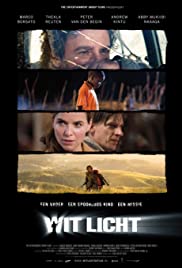
WIT LICHT (THE SILENT ARMY)
Holland, 2009, 92 minutes, Colour.
Marco Borsato, Abby Mukiibi Nkaaga, Andrew Kintu, Thekla Reuten.
Directed by Jean Van de Velde.
Director Jean van der Velde was born in the Congo and educated in Rwanda and Burundi. He clearly has deep feelings about Africa today, its independence and prosperity, the rebel movements with armies of children who have cause massacres and migrations.
A film can be cinema, judged by the highest artistic standards. Or a film can be a movie, an entertainment made for a mass audience and to be commercially successful. With its straightforward plotting and practical craft as well as its earnest message for the widest audience, The Silent Army is a movie.
Filmed in South Africa but, particularly in Uganda, a country notorious for its abduction of children to fight, the film wears its heart on its sleeve. It opens with bonds of friendship between a black boy, Abu, and a white boy, Thomas, everything normal in a 21st century African town until the rebels raid and Abu is taken in a sequence that is shocking and makes the point about this use of children as appalling. When the rebel leader appears with his genial but deadly speech to the children, already brainwashing them to call him (and shout), 'Daddy', the children's cause is lost.
The film combines scenes of the children trained in weapons and killing as well as a raid on a church in a village, with the search by Tom's father for Abu.
Perhaps the plotting is too simplistic and the ending a bit too heroic for strict analysis, but the film is intended to rouse the reactions of a public who may not be familiar with these issues.
1.A serious film with a message? Using a popular genre for communicating the message to the wide public?
2.The final Bonhoffer statement about people’s silence and not acting? The consequences?
3.The location photography in Uganda and South Africa? Standing in for African countries in general? The town, the mountains, the countryside? The musical score?
4.The African experience of rebels, child armies, the experience of Uganda and Congo?
5.The opening, the human feeling, Abu and his father, the gift of the wooden video control? His friendship with Thomas, black and white? Sharing in the computer games? Abu’s mother and her work? Racial friendliness? His going home, the poverty, his playing soccer? His father’s support?
6.Edward and his restaurant, Thomas and his place there, the mother? The Christmas dinner and the guests, the generator, singing Silent Night? The need for more deserts? The mother, her impatience, driving, hitting the animal, the crash and her death? The funeral, Thomas and his drawing on the coffin, the rain? Abu embracing him?
7.The shock of the rebel attack on the village, its brutality, the fires, stealing the sneakers, the little girl with the sneaker, going into the tent, the grenade explosion? Abu and his playing soccer, the torch in his face, the command that he kill his father, his father permitting him to do this?
8.The aftermath, the photographer, Edward on the scene? Thomas upset, the authorities, checking on the arms dealer and his visiting the restaurant?
9.Obeke, the towering presence, his speech to the children, wanting them to call him Daddy, getting them to shout it louder? Telling them that he could read their minds? The little girl wanting to go home, the boy frightened, his asking them to kill each other? The children descending on their victims? The killing, the training, the tests with guns, the blindfold? The young men as officers?
10.Abu, changing, the brainwashing? The boy urging him to phone – and the call to the video store and the succession of numbers? Their being caught, the boy denying it, blindfold assembly of the guns, Abu shooting?
11.The attack on the village, the people in the church, the laying of the mines, the explosion, the young man and the injury to his leg, his being left for dead, Abu taking the sneaker?
12.Edward and Thomas, their drive, the night and the fright with the man wanting the light for the cigarette? The roadblock, their being turned back? Going to the refugee camp? The encounter with Valerie? The photographer being there? Clashes? The fact that Edward had known Obeke as a customer? The young girls who ran away, the supplying of information? Edward taking the jeep, going? Val and Bosco and their reaching the village, the victims in the church, saving the children hidden in the pipe?
13.Edward going to the bush, Valerie bringing him the water? The map? The boy injured from the mine, Edward finding him, Val and Edward burying him with branches? Edward being taken prisoner?
14.Obeke Ama and her tongue cut out, her being Obeke’s servant? The irony of the photographer, the smuggling of the gold to pay for the arms? The arrival of the plane? Obeke and his external courtesy, talking with Edward, yet having Ama poison the tea? The irony of Ama drinking it? Obeke letting Edward go, Abu not acknowledging Edward, defiant? Accompanying Edward and his leaving?
15.The plane, the arms dealers, Ama and her pregnancy, Obeke realising what had happened, his speech to Ama? The explosion?
16.The escape, the plane, Edward taking Abu? Based on true stories of refugees? The film and its story told as a movie rather than cinema art?